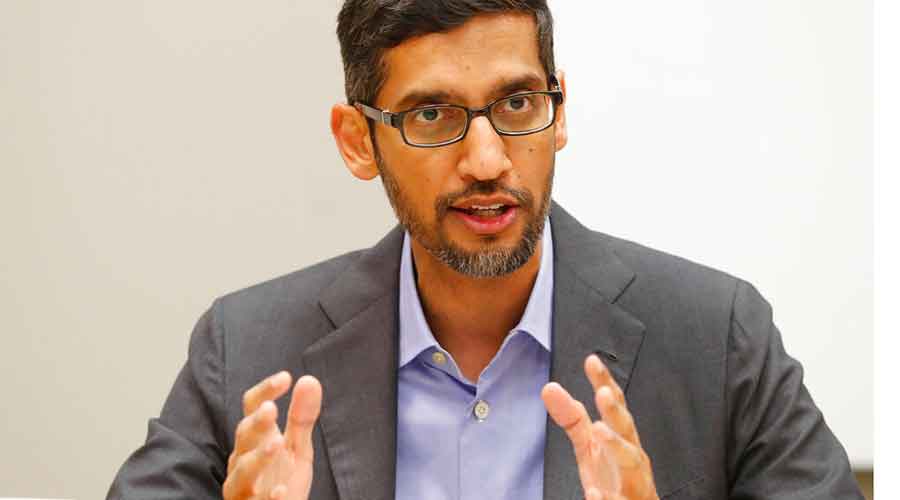Google and Alphabet CEO Sundar Pichai on Monday announced plans to invest $10 billion (Rs 75,000 crore) in India over the next five-to-seven years. Pichai was speaking at a virtual event, the sixth annual edition of Google for India.
“We’ll do this through a mix of equity investments, partnerships, and operational, infrastructure and ecosystem investments,” Pichai said.
The investments will focus on four areas: Enabling affordable access and information for every Indian in their own language.
Second, building new products and services that are deeply relevant to the country’s unique needs.
Third, empowering businesses as they continue or embark on their digital transformation; and fourth, leveraging technology and AI for social good, in areas such as digital literacy, outbreak in rural areas, health, education, and agriculture.
Earlier in the day, Pichai interacted with Prime Minister Narendra Modi.
Lauding Digital India’s success, Pichai said the country has made huge progress in getting a billion Indians online. Low-cost smartphones combined with affordable data and strong telecom infrastructure have ushered in new opportunities.
Google also announced an initiative with Prasar Bharati, launching an edutainment series on Doordarshan on how small businesses can adopt digital tools and adapt to the current situation, using examples of real life Indian businesses.
Google also announced a partnership with the CBSE to train over 1 million teachers in 22,000 schools across India by the end of 2020, to deliver blended learning that combines the classroom approach with online learning, using free tools such as G Suite for Education, Google Classroom, and YouTube.
To support underserved low-income communities, it announced a Google.org grant of $1 million to Kaivalya Education Foundation (KEF) as part of the Global Distance Learning Fund. Google has already made some direct and indirect investments in Indian startups such as local delivery app Dunzo.
Indian-born Pichai joined Google in 2004, and is widely credited for making the Chrome browser. He replaced company co-founder Larry Page as CEO of parent Alphabet Inc last year.
The US tech group, whose Android mobile operating system powers a bulk of India’s roughly 500 million smartphones, will continue to work with manufacturers to build low-cost devices so that more and more people can access the internet, another Google executive said.
Digital tax
Pichai said he supported a multilateral solution for taxing digital services that is under discussion by the Organisation for Economic Cooperation and Development (OECD), according to Reuters.
The OECD talks involve over 100 countries on a major rewrite of global tax rules to bring them up to date for the digital era, but they have so far not produced results as the negotiations have been complicated by the coronavirus pandemic.
The US has already initiated investigations of digital services taxes adopted or being considered by countries such as France, India and Turkey, saying it discriminates against US tech firms.
Pichai said it was important to rely on OECD frameworks, which he referred to as the “right approach”.
“It’s not (an issue) for an individual company to solve,” Pichai said in an interview to Reuters. “We would be supportive of the OECD engagement.”
Countries imposing digital service taxes see it as a way to raise revenue from the local operations of big tech companies which they say profit enormously from local markets while making only limited contributions to public coffers.
Advertisement
Google and other companies have been concerned with India’s recent decision to impose a 2% digital tax that also applies on advertising revenue earned overseas if the ads target customers in India, Reuters has previously reported.
Pichai did not directly comment on the Indian tax.
His comments came as Google announced a plan on Monday to invest $10 billion into Indian companies over 5-7 years, marking its biggest bet on the South Asian market and its fast-growing digital economy.
Google and other tech companies also continue to face a raft of regulatory hurdles around the world as governments impose more controls over how big technology companies use and process data of millions of users.
In terms of the data regulations being developed in India and other countries, Pichai called for a balanced approach of policy making that promotes innovation.
“It’s important you find the balance in protecting the privacy of your citizens but allowing for free flow of products and services,” Pichai said.










